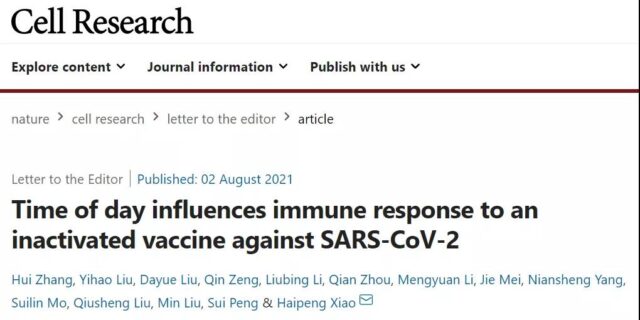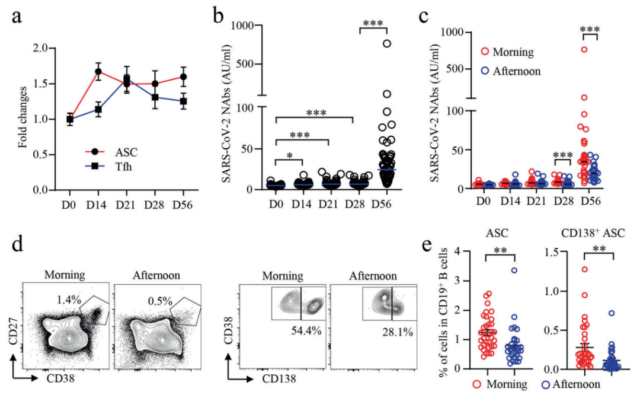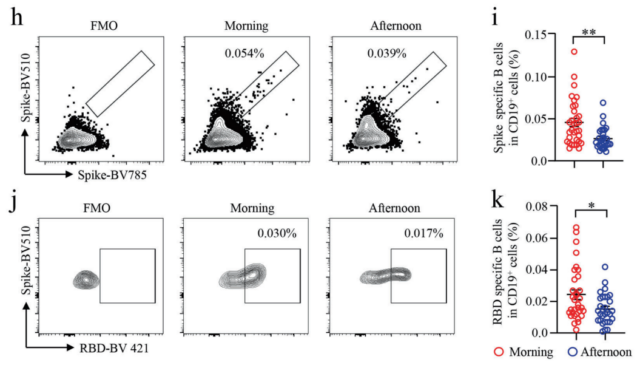Stronger protective immune response if COVID-19 vaccinated in the morning
- Normal Liver Cells Found to Promote Cancer Metastasis to the Liver
- Nearly 80% Complete Remission: Breakthrough in ADC Anti-Tumor Treatment
- Vaccination Against Common Diseases May Prevent Dementia!
- New Alzheimer’s Disease (AD) Diagnosis and Staging Criteria
- Breakthrough in Alzheimer’s Disease: New Nasal Spray Halts Cognitive Decline by Targeting Toxic Protein
- Can the Tap Water at the Paris Olympics be Drunk Directly?
Stronger protective immune response if COVID-19 vaccinated in the morning
- Israel new drug for COVID-19: EXO-CD24 can reduce deaths by 50%
- COVID-19 vaccines for children under 12 will be available soon
- Breakthrough infection of Delta: No difference from regular COVID-19 cases
- French research: ADE occurred in Delta variant and many doubts on it
- The viral load of Delta variant is 1260 times the original COVID-19 strain
Stronger protective immune response if COVID-19 vaccinated in the morning. Cell Res: The COVID-19 vaccine in the morning is more effective and produces a stronger protective immune response.
The COVID-19 pneumonia (COVID-19) caused by the COVID-19 virus (SARS-CoV-2) is still raging around the world. So far, it has infected 200 million people and caused more than 4.2 million deaths. It will also bring more far-reaching effects. Continuous impact. Safe and effective vaccines play a vital role in controlling the COVID-19 pandemic.
However, due to the long time required for vaccine production, the difficulty of vaccine distribution, and some people’s doubts about the safety and benefits of vaccines, the global vaccine coverage rate has slowed down. Therefore, making full use of available resources and maximizing the effectiveness of vaccination is essential to combat COVID-19.
Circadian Rhythm (Circadian Rhythm) refers to changes in life activities in a cycle of about 24 hours. There are also obvious circadian rhythm fluctuations in human physiological functions, learning and memory abilities, emotions, and work efficiency. The human immune system is also affected by the circadian rhythm. The number and functions of immune cells in the blood change in a circadian rhythm.
The circadian rhythm is closely related to human activities. The destruction of the circadian rhythm and lack of sleep may lead to the occurrence of many diseases, especially chronic diseases, which affect the health of the body.
So, does vaccination at different times in the 24-hour circadian cycle have different effects?
On August 2, 2021, the Dean Xiao Haipeng’s team of the First Affiliated Hospital of Sun Yat-sen University published a paper titled: Time of day influences immune response to an inactivated vaccine against SARS-CoV-2 in the Cell Research journal.
The study found that compared to the afternoon, vaccination in the morning will produce a stronger protective immune response. The research team believes that this is due to the human immune system being affected by the circadian rhythm.

In order to determine the impact of different vaccination times during the day on the effect of the COVID-19 vaccine, the research team investigated the immune response of medical staff after being vaccinated with the COVID-19 vaccine in the morning and afternoon. Neutralizing antibodies are detected by chemiluminescence immunoassay of the receptor binding domain (RBD) of the new coronavirus S protein, and used for immunophenotype monitoring and antigen-specific memory B cell measurement by flow cytometry.
The 63 medical staff of the First Affiliated Hospital of Sun Yat-sen University received the COVID-19 inactivated vaccine (BBIBP-CorV from Sinopharm) in the morning (9-11 am) or afternoon (15-17 pm) as required. All participants received the first dose on day 0 and the second dose on day 28. The time of the two doses remained the same.
All participants collected blood samples for testing on Day 0, Day 14, Day 21, Day 28, and Day 56. The study was approved by the Ethics Committee and the clinical trial. All participants signed a written informed consent. , No serious adverse events related to vaccination occurred during the experiment.
The inactivated vaccine caused a strong immune response, and the percentage of antibody secreting cells in B cells and follicular helper T cells (Tfh) in peripheral blood increased. In addition, the vaccine can induce a serological response, and after the first dose of the vaccine, the level of neutralizing antibodies gradually increases. Although the level of neutralizing antibody was lower after the first dose of vaccination, the level of neutralizing antibody began to increase greatly after the second dose of vaccination.
Surprisingly, the level of neutralizing antibodies in the serum of the participants vaccinated in the morning increased significantly, and the participants vaccinated in the morning also had stronger B cell and follicular helper T cell (Tfh) responses. By the 56th day, the percentages of antibody-secreting cells and CD138+ antibody-secreting cells of participants who were vaccinated in the morning were significantly higher.

The percentage of follicular helper T cells (Tfh) in participants who were vaccinated in the morning was 1.4 times that of those who were vaccinated in the afternoon. By the 56th day, the percentage of monocytes and dendritic cells in the morning inoculation group was also higher.

Immune memory of immune cells is essential for lasting protective immunity after vaccination. In order to further study whether immune memory is established after vaccination, the research team analyzed SARS in the peripheral blood of the vaccinated participants through flow cytometry. -CoV-2 specific memory B cells. It was found that the percentages of specific memory B cells for S protein and RBD in the blood of participants vaccinated in the morning were 3.3 times and 1.6 times that of the group vaccinated in the afternoon.

In general, the results of this study show that the inactivated vaccine can induce a strong serological response, and the vaccinators have acquired long-term protective immune memory against SARS-CoV-2. Interestingly, this study showed that vaccination in the morning produces a stronger protective immune response compared to vaccination in the afternoon.
The human immune system is affected by the circadian rhythm, and the immune response is also different at different times of the day. This study also observed changes in immune cells in the blood from morning to afternoon. Therefore, using the circadian rhythm of the human immune system, vaccination in the morning can obtain a stronger immune response and provide stronger protection.
Paper link:
https://www.nature.com/articles/s41422-021-00541-6
(source:internet, reference only)
Disclaimer of medicaltrend.org
Important Note: The information provided is for informational purposes only and should not be considered as medical advice.



